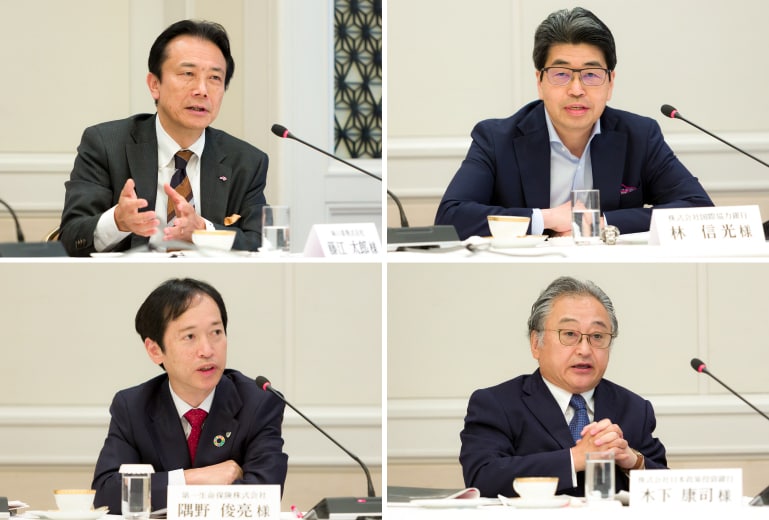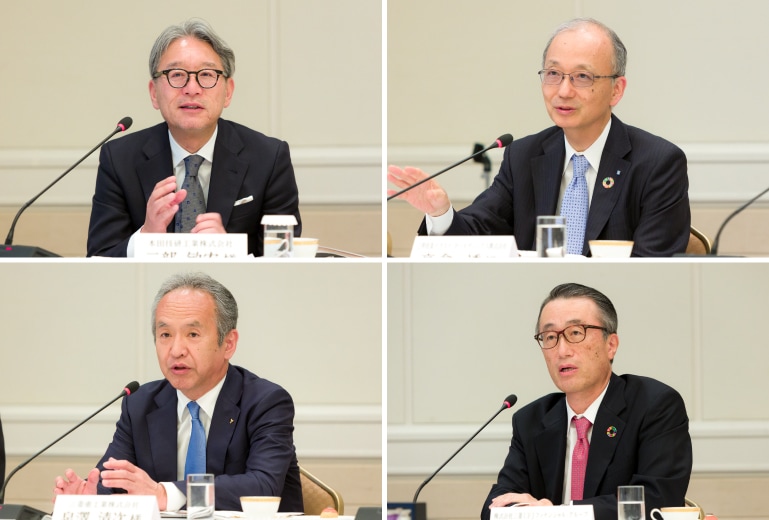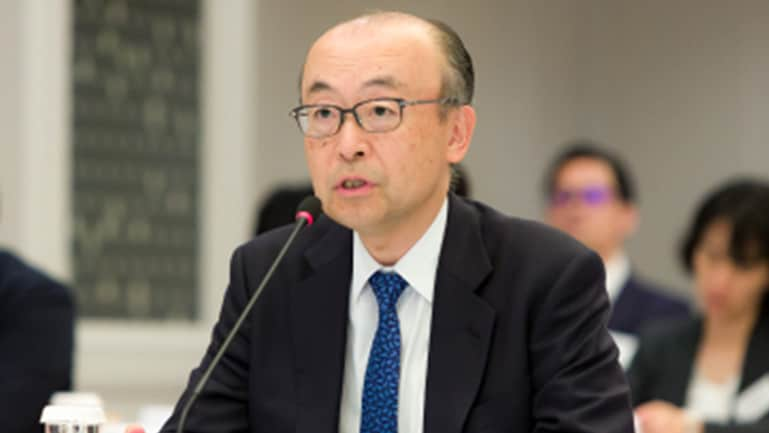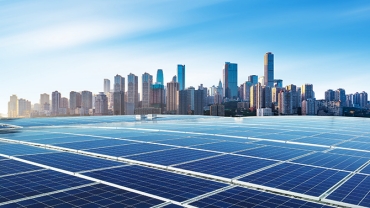
The Executive Sustainability Forum, an initiative first proposed by the PwC Japan Group, held its second meeting in Tokyo on 2 June 2023. Executives from 11 Japanese companies working on sustainability management discussed the achievements of Japanese companies to date, the roles they are to play in the future, and challenges associated with expanding the circular economy in Japan and the ASEAN region.

Taro Fujie, President and CEO of Ajinomoto Co. (top left), Nobumitsu Hayashi, Governor of Japan Bank for International Cooperation (top right), Toshiaki Sumino, President of The Dai-ichi Life Insurance Company (bottom left) and Yasushi Kinoshita, Chairman of the Development Bank of Japan (bottom right)
At the meeting, the PwC Japan Group defined the circular economy and explained both its potential as a business model as well as the challenges associated with development of a circular economy in the ASEAN region. This definition presented circularity as a common solution to global problems such as climate change, biodiversity and resource depletion, and broke response measures down into three categories: (i) those with strong economic rationale (e.g. automobiles and aircraft); (ii) those with uncertain economic rational but a high degree of social need (e.g. plastic bottles and plastics used in household appliances); and (iii) those with uncertain economic rational but great importance for human life (e.g. food, soil, forests and oceans).
The first step in integrating circularity into a business involves the transformation of products and equipment, for example through weight and volume reduction. The next step is to respond to the needs of clients and consumers for maintenance and product longevity. Furthermore, it is essential for companies to establish a consistent circular economic flow throughout the entire value chain, from the production and procurement of sustainable raw materials to the reprocessing of waste materials, resale and re-distribution of products to society. The key is to develop new markets where all companies involved in the circular economy can secure profits and business opportunities.
When it comes to promoting such initiatives in the ASEAN region, however, there are many issues that need to be resolved. For example, in the so-called ‘venous industry’, an industrial waste management industry which is involved in the reprocessing and resale of waste materials, there are many informal operators who are not officially registered. This lack of formal registration poses challenges in establishing a collaborative circular value chain with them. Furthermore, businesses also continue to face the difficult challenge of expanding these initiatives while also securing profitability, which is common around the globe. At this meeting, the forum members reaffirmed their recognition that one of core agenda items of the forum is determining how Japanese corporations can actively participate in these challenges and utilize the knowledge they have accumulated thus far.

Toshihiro Mibe, President and CEO of Honda Motor Co. (top left), Toru Takakura, President of Sumitomo Mitsui Trust Holdings (top right), Seiji Izumisawa, President and CEO of Mitsubishi Heavy Industries (bottom left) and Kanetsugu Mike, Chairman of Mitsubishi UFJ Financial Group (bottom right)
Next, Ian Bremmer, President of Eurasia Group and GZERO Media, gave an online speech entitled ‘Geopolitics of Circular Economy in ASEAN’. Dr Bremmer pointed out that ‘using materials and energy more sustainably can be and will be viewed as a means of national security, especially given heightened structural geopolitical tensions with Russia and with China.’ He said Japanese companies have always been ‘high-tech innovators’ in areas such as hydrogen and solar power, adding that ‘leading Japanese technologies, like the recycling of plastic polymers, are going to be an asset and are an interesting niche area in helping countries that are struggling with massive plastic waste.’ He also emphasised that ‘sustainability factors are going to become essential and integral pieces of our future economic health.’
During the discussion on identifying effective business models and challenges for Japanese corporations in promoting a circular economy in the ASEAN region, it was pointed out that even though ASEAN is a major growth region, any business model established should be deeply interconnected with daily life to ensure its success. In response to this, a participant commented that it could be effective to work with local companies and governments to provide services that create incentives for consumers, such as implementing ‘point systems’ that reward users for recycling.
Ensuring the reliability of circularity-related data is also extremely important for business development. If the traceability of recycled materials can be extended to the entire value chain, it would be possible to increase the credibility and environmental value of circularity. In order to realise this goal, the forum members expressed a hope that advanced technologies, one of the strengths of Japanese companies, can be used to increase credibility. Furthermore, they presented that the technological capabilities and speed of Japanese companies is anticipated by ASEAN countries, and Japan has the potential to work with each country to meet its specific needs in these areas.
Creating new value chains also means transforming the industrial structure. It is therefore essential to build sustainable, ultra-long-term investment and financing mechanisms. Furthermore, in order to nurture circularity into a profitable business, the scaling-up of the circular economy will be critical. And in order to realize the scaling-up, it is necessary to aim for achievement of an optimum solution across the entire value chain by collaboration among various companies, as well as to coordinate with the public and private sectors to roll out successful models to other regions and industries. While closing the loop of the circular economy will need trials in the regions and area where it is currently feasible to do so, those efforts will eventually have to be scaled up. Some participants at the meeting remarked on a need for ways to measure the outcomes of circularity and evaluate its economic value, both to increase incentives for investment and to make investment decisions.
Interest in the circular economy is also growing among the international community; the G7 Hiroshima Leaders’ Communiqué included a commitment to ‘engage with developing and emerging countries to accelerate emission reduction, including by supporting their transitions to climate resilient, circular, and nature positive economies and net-zero GHG emissions through various and practical pathways taking into account national circumstances’.
It is therefore necessary for Japanese companies to exert a presence in areas where they can play a leading role, while exploring priorities in accordance with the challenges inherent in each ASEAN member state, and to establish specific strategies and goals that lead to strong action. In order for ASEAN and Japan to expand the path of co-prosperity in the circular economy, strong leadership by the private sector across industry boundaries is needed in the initial stages, and in the future, local public-private partnerships will be essential for expanding initiatives. With this awareness, the participating executives reaffirmed their goal of helping the Executive Sustainability Forum evolve into a ‘circular business hub’ that connects leaders in Japan, ASEAN and around the world.

Koichiro Kimura, Chairman, PwC Japan Group
Looking toward its next meeting, the forum will continue to discuss specific initiatives for realising a circular economy in the ASEAN region as well as assessing effective financial schemes and will also consider potential ASEAN partners who may be interested in working with the forum. The forum will also work on crystallising its vision and will consider the possibility of promoting that vision through opportunities such as international conferences.
The Executive Sustainability Forum was launched in 2022 under the mutual understanding that countries must share the goal of sustainability and take measures that accommodate local circumstances to achieve sustainable growth in Asia including Japan. The forum will continue to explore solutions for creating a sustainable world through the exchange of views between the executives of companies engaged in a wide range of businesses, while also considering the unique circumstances facing Asian countries, which may differ from those in the West.
* Please note that company names and executive titles in the text are current as of the meeting in June 2023. Please also note that in addition to the 11 corporations that participated in this meeting, JERA Co., Inc. has joined the forum and is scheduled to participate in the next meeting.
Our Team
Masataka Kubota
Territory Senior Partner, PwC Japan Group


